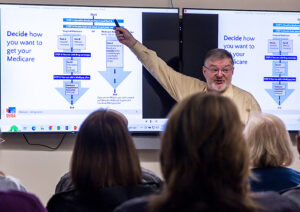Legal Help Accessing Public Benefits
Solid Ground’s legal team ensures that people have equitable access to public benefits for housing and essential needs, cash, food, child care and health care.
Our Benefits Attorneys provide information, advice and legal representation to help people whose state public assistance benefits – including Basic Food (food stamps), Apple Health (Medicaid), TANF (Temporary Assistance for Needy Families), Working Connections Child Care and ABD (Aged, Blind and Disabled) – have been reduced, terminated or denied.
We advocate on behalf of clients with DSHS caseworkers, represent people in administrative hearings, and advise those choosing to represent themselves. We also provide training on state benefits to community service providers and do outreach through food banks, shelters and other direct service programs. The intake process includes telephone screenings and in-person interviews as needed.
Addressing Systemic Problems
A significant portion of our legal work focuses on helping people obtain rightful extensions on TANF benefits for disability and domestic violence. By tracking and understanding this trend, our attorneys succeeded in getting DSHS to rewrite its policy manual around the family violence time limit extension.
This level of systems advocacy work leverages the real experiences of people struggling with the system to improve it and create more equitable access to benefits.

This program receives funding from the King County Veterans, Seniors & Human Services Levy.
Help Navigating Medicare
Solid Ground’s Statewide Health Insurance Benefits Advisors (SHIBA) volunteers help people understand Medicare rights and options. Our well-trained volunteers counsel people of all ages – including people under age 65 living with disabilities, people getting ready to turn 65, and those already enrolled – about their Medicare choices and options.
SHIBA volunteers assist people through one-one one consultations through phone, video chat or in-person appointments. They answer Medicare questions, make referrals, and help evaluate and compare health insurance policies so people can make informed decisions to find the best possible coverage that meets their needs and fits their budgets. Volunteers can also help screen to see if people qualify for low-income programs to save money on Medicare coverage. SHIBA is accessible, objective, unbiased, and completely FREE and confidential.
~Offered in partnership with the Washington state Office of the Insurance Commissioner, Solid Ground is your local SHIBA office in King County.~
Resource Wire
Resources available for people living on low incomes are constantly changing. Fortunately, Resource Wire delivers current, relevant community resources, job opportunities, and information for people living on low incomes and the agencies that serve them including:
- getting a job
- securing housing
- accessing health care and social services
- learning about community events and resources
Each week, we post new information on the Groundviews blog, which we send out via email and Facebook. Current and ongoing resources are posted on the Resource Wire webpage.



